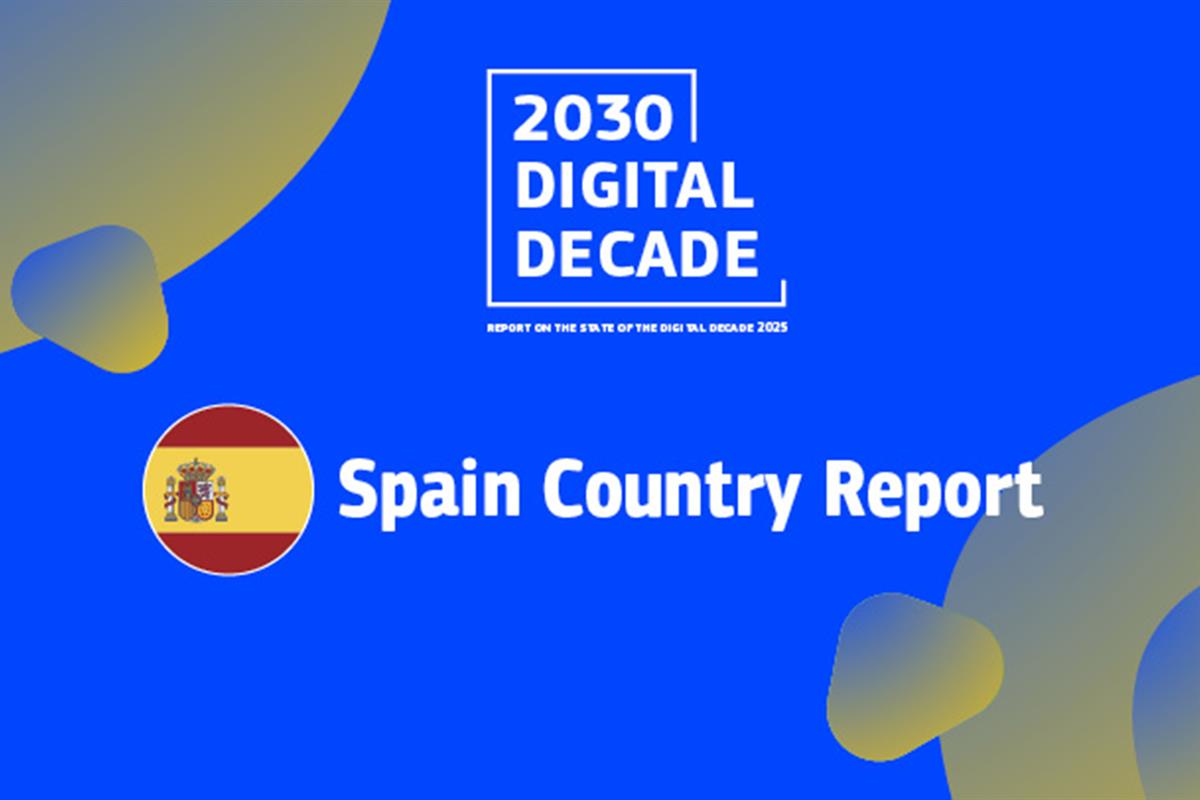Spain consolidates its digital leadership in Europe, according to the State of the Digital Decade 2025 Report
News - 2025.6.16
 Cover of the State of the Digital Decade 2025 Report
Cover of the State of the Digital Decade 2025 Report
Spain is making steady progress in its digital transformation and consolidating its position as a European benchmark in innovation, connectivity and emerging technologies, areas that are promoted by the Minister for Digital Transformation and Public Function. This is reflected in its excellent performance in the key indicators of the Digital Decade 2030, Europe's strategy to accelerate the digitisation of the continent.
The European Commission's report highlights that our country leads the roll out of digital infrastructures in Europe. Spain is the country with the second best fibre optic coverage, reaching 95% of households and 86.3% in rural areas, well above the European average, which in rural areas only reaches 58.8% of households. As far as 5G technology is concerned, coverage reaches 95% of the population and 8 out of 10 people living in rural areas.
Spain has also made significant progress in the roll out of edge nodes and is already the third country in Europe with the highest number, 301 nodes. These nodes allow data to be processed close to its source, reducing latency, improving speed and optimising bandwidth usage, making them critical to the advancement of 5G, cloud computing and the development of the internet of things.
Boosting artificial intelligence and key technologies
The Spanish technology ecosystem is experiencing an unprecedented moment of dynamism. According to the document, the country is reinforcing its role as a European benchmark in artificial intelligence in the public interest. ALIA, the first foundational artificial intelligence model developed entirely in Spanish and co-official languages, marks a milestone in technological sovereignty. The document also points out that Spain has been a pioneer in launching a regulatory sandbox for high-risk AI systems, making it easier for companies and startups to adapt to future European legislation.
The report highlights the commitment to key technologies, which is reflected in the roll out of the National Quantum Technologies Strategy, which has been allocated 800 million euros; and in the PERTE Chip, which will mobilise 12.25 billion euros to strengthen the national semiconductor value chain.
More digital companies, stronger startups
The Spanish business fabric is making steady progress in its digitalisation, with improvements in both large companies and SMEs, driven by public programmes, sectoral data spaces and an environment that is increasingly prepared for the adoption of emerging technologies.
The document highlights that almost three out of four SMEs already have a basic level of digital intensity and a growing share is moving towards more sophisticated levels. Programmes such as Digital Kit, Kit Consulting or GeneraciónD Pymes, promoted by the Secretary of State for Digitalisation and Artificial Intelligence with Red.es, have channelled more than 3 billion euros to digitise more than 700,000 companies.
In terms of entrepreneurship, the country already has 13 unicorns, maintaining the values of 2023. And, with the aim of strengthening its support for innovative entrepreneurship, the National Forum of Emerging Companies has been created.
Connected and digitally empowered citizens
Spain is well above the European average (55.56%) in basic digital skills, which 66.18% of the Spanish population already has. Progress is even greater among young people (over 83%), which has been achieved by reducing territorial and gender gaps.
The report reflects this effort to reduce the digital divide with the digital engagement programme for citizens, launched by Red.es, aimed at digital engagement, through training courses throughout the country, of the population at risk of digital exclusion.
The annual change in the percentage of IT specialists in Spain was higher than in the European Union: 6.8% compared to 4.2%. Moreover, graduates in IT disciplines in Spain accounted for 5.7% of the total in 2023, compared to 4.7% in the EU as a whole. The programmes launched by Red.es for the Attraction and Retention of Talent in Artificial Intelligence and for training in digital skills through professional associations are proof of Spain's efforts to increase the number of IT specialists.
Digital public services at the service of citizens
Applications such as My Citizen Folder, the Digital DNI (MiDNI) or the use of virtual assistants with AI in the Tax Agency and in health services are examples of the people-centred approach guiding this transformation.
Spain has therefore reached a score of 88.75 (compared to the European average of 82.20) in digital services for citizens, and the use of digital channels to interact with the Administration has become widespread among the population. This result consolidates a track record of more than two decades of public digitisation.
Cybersecurity, sustainability and digital rights
The report also highlights the protection of critical digital infrastructure and the strengthening of national cybersecurity capabilities as priorities. More than 120 public entities now have new cybersecurity operations centres (SOCs), a key measure to improve threat detection and response across the country.
Spain is also leading initiatives to link digitisation and sustainability, such as the National Green Algorithms Programme or data spaces focusing on biodiversity, water and energy.
The report highlights Spain's commitment to digital rights, underlining its active role in the implementation of the European Declaration on Digital Rights and Principles, through measures such as the Digital Rights Observatory.
About the report
The European Commission publishes the 2025 report on the state of the Digital Decade as part of the annual cycle of cooperation with the Member States. This exercise aims to assess progress towards the 2030 commitments on digital skills, connectivity, business digitisation, digital public services and emerging technologies.
These targets include at least 80% of the adult population having basic digital skills; all populated areas being covered by gigabit connectivity; more than 90% of SMEs having a basic level of digitisation; and all key public services being fully available online.
The country report on Spain provides a detailed snapshot of the current situation, identifying both consolidated progress and areas where efforts need to be intensified. This evaluation is particularly important in the context of the mid-term review of the European programme scheduled for 2026, which will redefine goals and priorities in the light of the results.
Non official translation





